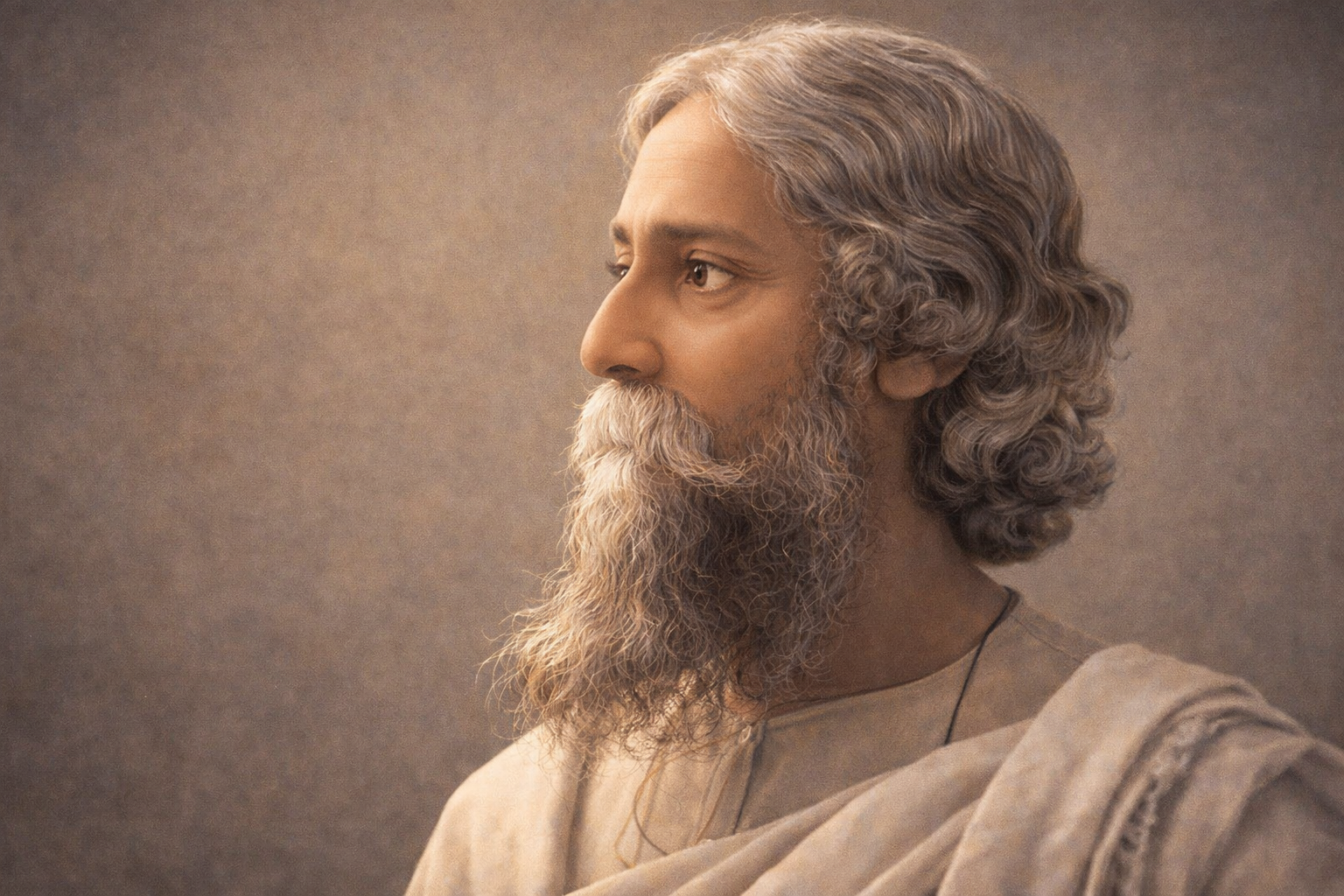Rabindranath Tagore was born on May 7, 1861, in the Jorasanko mansion of Calcutta, into a family where art, literature, and reform were as much a part of the air as the fragrance of incense at dawn.
The youngest of thirteen children, he grew up under the gentle but unyielding influence of his father, Debendranath Tagore — a philosopher and leader of the Brahmo Samaj — and the quiet inspiration of his mother, Sarada Devi.
As a boy, Tagore resisted the confines of formal schooling.
“The highest education is that which does not merely give us information but makes our life in harmony with all existence.”
He preferred wandering through gardens, watching sunlight play through leaves, and letting stories and poems bloom in his mind.
The Early Poet
By the age of 16, he had published his first substantial poetry collection, under the pen name Bhanusimha (Sun Lion). His words were not just literary compositions — they were a bridge between the eternal and the everyday.
At 17, he was sent to England to study law, but the grey skies of London could not tether his heart to legal briefs.
Instead, he immersed himself in Shakespeare, English poetry, and Western music — absorbing them, yet never losing the deep rhythm of Bengal in his soul.
Visions of a New India
Returning to India, Tagore became not only a poet but also a visionary reformer. He believed education should be rooted in freedom and creativity.
This dream took form in Santiniketan, the “Abode of Peace,” which he founded in 1901. Here, learning was open to the skies, where classes could be held under the shade of trees, and where art, music, and nature were as essential as reading and writing.
“Don’t limit a child to your own learning, for he was born in another time.”
Gitanjali and the Nobel Prize
In 1912, Tagore carried a manuscript of his poems, Gitanjali (Song Offerings), to England. The translations — imbued with a mystical tenderness — enchanted the literary world. In 1913, he became the first non-European to receive the Nobel Prize in Literature, honored for verses that, as the Swedish Academy declared,
“made his poetic thought a part of the literature of the West.”
His poem, “Where the mind is without fear and the head is held high”, became a prayer for India’s soul — a call to awaken to dignity, reason, and freedom.
A Voice for Humanity
Tagore traveled the world — from Japan to the Americas, from Europe to Southeast Asia — speaking not only of poetry but of peace, cultural exchange, and the unity of mankind. He met Einstein, conversed with Yeats, exchanged thoughts with Gandhi, and stood as a rare figure who combined the poet’s heart with the reformer’s vision.
“Patriotism cannot be our final spiritual shelter; my refuge is humanity.”
Yet he did not shy away from criticizing colonial rule. In 1919, after the Jallianwala Bagh massacre, he renounced his knighthood — a symbolic blow to imperial arrogance.
The Artist Without Boundaries
Tagore’s creativity could not be confined to poetry. He wrote novels (Gora, The Home and the World), plays, short stories, essays, and more than 2,000 songs — including India’s national anthem, Jana Gana Mana, and Bangladesh’s Amar Shonar Bangla.
In his 60s, he began painting, creating hundreds of artworks with a style uniquely his own.







Final Years and Legacy
In his last years, illness often visited him, but so did visions. His later poetry grew more abstract, mystical, and luminous, as if he were already conversing with eternity. On August 7, 1941, Rabindranath Tagore passed away in the same Jorasanko home where his journey had begun.
But his words did not die. They remain as morning songs on Bengal’s rivers, as prayers whispered in classrooms, as quiet revolutions in the minds of dreamers.
“Faith is the bird that feels the light and sings when the dawn is still dark.”
He was affectionately called “Gurudev”, “Kabiguru”, and “Bard of Bengal.”
Rabindranath Tagore was not just a poet — he was a river.
A river that carried the music of the East to the West, the wisdom of the past into the future, and the quiet light of the soul into the noisy corridors of the world.
Gitanjali: Song Offerings (1912)
“Light, my light, the world-filling light, the eye-kissing light, heart-sweetening light!
Ah, the light dances, my darling, at the centre of my life; the light strikes, my darling, the chords of my love; the sky opens, the wind runs wild, laughter passes over the earth.
The butterflies spread their sails on the sea of light. Lilies and jasmines surge up on the crest of the waves of light.
The light is shattered into gold on every cloud, my darling, and it scatters gems in profusion.
Mirth spreads from leaf to leaf, my darling, and gladness without measure. The heaven’s river has drowned its banks and the flood of joy is abroad.”
“I know that the day will come when my sight of this earth shall be lost, and life will take its leave in silence, drawing the last curtain over my eyes.
Yet stars will watch at night, and morning rise as before, and hours heave like sea waves casting up pleasures and pains.
When I think of this end of my moments, the barrier of the moments breaks and I see by the light of death thy world with its careless treasures. Rare is its lowliest seat, rare is its meanest of lives.
Things that I longed for in vain and things that I got—let them pass. Let me but truly possess the things that I ever spurned and overlooked.”
